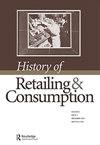Global goods away from global trading points? Tea and coffee in early modern Bern
Q2 Arts and Humanities
引用次数: 1
Abstract
ABSTRACT During the seventeenth and eighteenth centuries, Europe imported ever-increasing quantities of previously unknown consumer goods – porcelain, spices, tea and coffee, textiles, especially silk and cotton – the list goes on and on. Historians readily acknowledge these goods were catalysts in sparking transformations to early modern European consumption, trade, and material culture. While these developments have been investigated thoroughly for northwestern Europe, Switzerland's place within this narrative remains to be assessed. This article probes the consumption of tea and coffee in seventeenth- and eighteenth-century Bern. First, it first looks at their public consumption – in coffeehouses, taverns, and inns. Second, using a serial run of bankruptcy inventories, it investigates their private consumption in Bern, and whether there were marked differences in the chronology and levels of consumption of a global good like tea and coffee between polities with and without trading companies, port cites, and colonies.全球商品远离全球贸易点?现代早期伯尔尼的茶和咖啡
摘要在17世纪和18世纪,欧洲进口了越来越多以前不为人知的消费品——瓷器、香料、茶和咖啡、纺织品,尤其是丝绸和棉花——不胜枚举。历史学家欣然承认,这些商品是推动欧洲早期现代消费、贸易和物质文化转型的催化剂。尽管这些事态发展已经在西北欧进行了彻底调查,但瑞士在这一叙述中的地位仍有待评估。本文探讨了十七、十八世纪伯尔尼对茶和咖啡的消费。首先,它首先考察了他们的公共消费——在咖啡馆、酒馆和客栈。其次,使用一系列破产清单,调查了他们在伯尔尼的私人消费,以及在有贸易公司和没有贸易公司、港口城市和殖民地的政体之间,茶和咖啡等全球商品的消费时间和水平是否存在显著差异。
本文章由计算机程序翻译,如有差异,请以英文原文为准。
求助全文
约1分钟内获得全文
求助全文
来源期刊

History of Retailing and Consumption
Arts and Humanities-History
CiteScore
0.50
自引率
0.00%
发文量
3
 求助内容:
求助内容: 应助结果提醒方式:
应助结果提醒方式:


